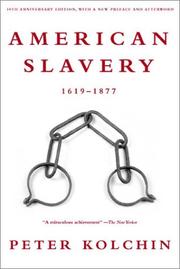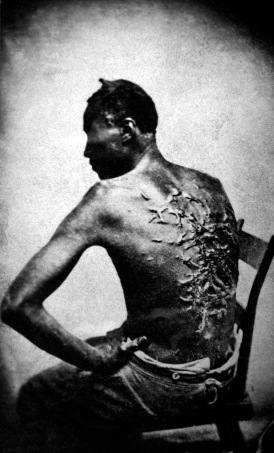My book club last night met to discuss American Slavery: 1619-1877 by Peter Kolchin. I recently posted on the book, but last night I got to thinking about what is so ugly about slavery; I don't think the book really brought the reader to appreciate how bad is was to be a slave.
As a slave one could be in the power of a sadist, beaten, broken or even killed without protection of law or man. As a slave, one could have been in the power of a sexual predator without any refuge or protection. I assume that there were not that many sadists and even a limit to the number of sexual predators, so that many slaves were owned by better people. Indeed, slaves were valuable property of their owners, not to be lightly damaged; in the antebellum period Kolchin tells us there were books and articles advising the slave holder to be responsible for the health and welfare of his slaves. However, even the slave fortunate enough to be owned by a kind and responsible person could not be sure that he/she would not be sold to someone much, much worse, or that his/her spouse or child would be abused by an owner.
Kolchin informs us that most slaves in America were in small farms with few slaves. In the latter days of slavery, slave women had large numbers of children. Thus we can assume that most slave men and women lived in a community with an owner and his family, one or two other adult slaves and several slave children. The adult slaves would be worked long and hard, the children given no opportunity for schooling. Every aspect of the slaves life would be controlled by the owner -- when he/she got up, when he/she ate and what he/she ate, when he/she worked, and when he/she went to bed. The clothing would be poor, and would be chosen by the owner and given at a time and occasion of the owner's choice.
Much more painful would be the lack of ability to choose one's spouse or to protect one's family. Marriages had to be approved by one's owner and often one's spouse was determined by one's owner. If the marriage didn't work out, one was not free to divorce and might be beaten for good measure. If one was deeply attached to one's spouse, that spouse could be sold and shipped away never to be seen again. A enslaved man could not protect his wife against the sexual attention of owners or even passing whites. Enslaved parents could not protect their children against mistreatment, could not be sure that the children would not be sold away.
Moreover, there was total despair. The indentured servant knew that after a specified time of servitude, he/she would be free. The slave knew that he/she would never be free, nor would his/her children nor grandchildren. There was no hope.
For the American slave, there was not even the significant possibility of escape nor revolt. The American slaves were the minority in their communities, identifiable by race, and the white communities in which they lived monopolized weapons, police powers and the militia. Systems were institutionalized to capture escaped slaves, and indeed a black freedman could be kidnapped and sold back into slavery and often they were.
In the early days of slavery, most slaves were men, since most of the slave trade was in men. Think of a man captured in Africa, subjected to imprisonment there and a horrific voyage in a slave ship, to be sold into a community in which he did not even understand the language, seeking to understand how to live and survive as a slave. Think of the children of men who survived and procreated, living themselves in despair.
Thus the condition of slavery could be horrific and at best was one of powerlessness, danger, discomfort, pain, and hopelessness that continued from the earliest childhood to one's death.
Think about the lack of empathy of the white population of the antebellum south who lived contentedly in a society that imposed such a condition on others by the million. Think about what it would do to white children to be brought up to believe that slavery was right, that the property rights of the slave owner's trumped the human rights of the slaves, and that the child would have the responsibility to drive slaves and fight for the institution of slavery! Ughh!
As a slave one could be in the power of a sadist, beaten, broken or even killed without protection of law or man. As a slave, one could have been in the power of a sexual predator without any refuge or protection. I assume that there were not that many sadists and even a limit to the number of sexual predators, so that many slaves were owned by better people. Indeed, slaves were valuable property of their owners, not to be lightly damaged; in the antebellum period Kolchin tells us there were books and articles advising the slave holder to be responsible for the health and welfare of his slaves. However, even the slave fortunate enough to be owned by a kind and responsible person could not be sure that he/she would not be sold to someone much, much worse, or that his/her spouse or child would be abused by an owner.
Kolchin informs us that most slaves in America were in small farms with few slaves. In the latter days of slavery, slave women had large numbers of children. Thus we can assume that most slave men and women lived in a community with an owner and his family, one or two other adult slaves and several slave children. The adult slaves would be worked long and hard, the children given no opportunity for schooling. Every aspect of the slaves life would be controlled by the owner -- when he/she got up, when he/she ate and what he/she ate, when he/she worked, and when he/she went to bed. The clothing would be poor, and would be chosen by the owner and given at a time and occasion of the owner's choice.
Much more painful would be the lack of ability to choose one's spouse or to protect one's family. Marriages had to be approved by one's owner and often one's spouse was determined by one's owner. If the marriage didn't work out, one was not free to divorce and might be beaten for good measure. If one was deeply attached to one's spouse, that spouse could be sold and shipped away never to be seen again. A enslaved man could not protect his wife against the sexual attention of owners or even passing whites. Enslaved parents could not protect their children against mistreatment, could not be sure that the children would not be sold away.
 |
| Slaves in Cumberland Maryland in 1862 |
Moreover, there was total despair. The indentured servant knew that after a specified time of servitude, he/she would be free. The slave knew that he/she would never be free, nor would his/her children nor grandchildren. There was no hope.
For the American slave, there was not even the significant possibility of escape nor revolt. The American slaves were the minority in their communities, identifiable by race, and the white communities in which they lived monopolized weapons, police powers and the militia. Systems were institutionalized to capture escaped slaves, and indeed a black freedman could be kidnapped and sold back into slavery and often they were.
In the early days of slavery, most slaves were men, since most of the slave trade was in men. Think of a man captured in Africa, subjected to imprisonment there and a horrific voyage in a slave ship, to be sold into a community in which he did not even understand the language, seeking to understand how to live and survive as a slave. Think of the children of men who survived and procreated, living themselves in despair.
Thus the condition of slavery could be horrific and at best was one of powerlessness, danger, discomfort, pain, and hopelessness that continued from the earliest childhood to one's death.
Think about the lack of empathy of the white population of the antebellum south who lived contentedly in a society that imposed such a condition on others by the million. Think about what it would do to white children to be brought up to believe that slavery was right, that the property rights of the slave owner's trumped the human rights of the slaves, and that the child would have the responsibility to drive slaves and fight for the institution of slavery! Ughh!


No comments:
Post a Comment